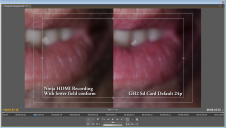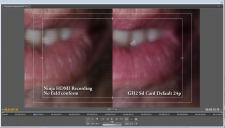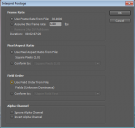
ST: HDMI Team
-
@Ralph_B Thanks Ralph, I will certainly do that.
However, I think what I'm really getting down to here is the structure of the hdmi .mov recordings, did you frame by frame analyse the original 30 fps and notice the pattern of;- frame 0 to frame 29 PiiPPPiiPPPiiPPPiiPPPiiPPPiiPP - (there' three progressive looking pictures followed by two interlaced pictures in a repeating pattern evry 30 frames) in all your recorder's clips?
By looking at that pattern I'd have thought you would know immediately what is happening to the 24p recording in the 30fps wrapper? And then of course the neccesary pulldown steps to take. You seem to be the specialist here and I would like your opinion of this pattern. -
The 3:2 pattern is normal for placing a 24P source into a 60i stream. But the GH2, alas, doesn't stay normal for long, and therin lies the problem. The only way to remove it's very non-standard pulldown is to invoke the power of Avisynth. At least, I haven't seen anything else that can do it.
-
@Ralph_B So even though I got regularity with all my GOP1 recordings I tested out of the HDMI (ie the pattern cadence stayed regular) that was just luck/ or for each setting a myriad of different things can cause this irregular cadence? I read somewhere that NTSC fields are presented Bottom field first - so I took the liberty of just checking LOWER FIELD FIRST in the NLE (PP) and all seems good and for that matter several 5 min recordings. Im just checking against the mts files now and of course, audio sync, which I think you said was .7 seconds out or summit on the hdmi audio input?
Many thanks for your help here mate. -
@driftwood
You have to be careful here. By checking lower field first, you're telling Premiere this is interlaced footage, which it most emphatically is not. It's progressive footage in an interlaced stream. So Premiere is going to deinterlace it, which is not the same thing as removing the 3:2 pulldown. Correct 3:2 pulldown will cleanly extract the original progressive frames, adding nothing and taking away nothing. Deinterlacing will mangle it all up. However, at a casual, uncritical glance, you might think it looks OK. I think this is where a lot of newbies go wrong.
A few other things:
The settings for the AVCHD encoder have no affect on the HDMI output. The HDMI is what it is.
Interlaced hi-def formats are all Upper Field first. The only format I know of that is Lower Field first is standard def DV (the one that was recorded onto little tape cassettes).
If you're still in doubt about this, you can send me the original file from the Ninja, and I'll take a look at it. -
@Ralph_B I've just done three consecutive 3 minute tests on HDMI ingest into Premiere Pro 4.1 with sync success and perfect picture on the PC (same for Mac) without having to resort to AVISynth.
Picture 1: Simply place the 30fps HDMI footage onto a 23.976 timeline aligned next to a identical GH2 24p 'default setting' recording on the master track and everything is in sync, no probs, then right click on Interpret Footage in the bin area and check the Conform to 'Lower Field First' box. Everything looks fine. If you don't do this picture 2 happens.
PS I also tested Vitaliy's HDMI ST 'End Skip 1', but as far as sync goes and pulldown on the Ninja it works the same with normal ptools settings, as what I used above. End Skip 2 and 3 are also being checked for any differences I might have missed in picture detail, etc...
 hdmi with lower field conform - picture remains pure.png1306 x 739 - 661K
hdmi with lower field conform - picture remains pure.png1306 x 739 - 661K
 hdmi with no field conform - picture remains jagged.png1307 x 742 - 1M
hdmi with no field conform - picture remains jagged.png1307 x 742 - 1M -
Also checked in detail - no artifacts.
-
Ok I'll forget pursuing this matter.
-
@driftwood
I want you to examine the output very, very carefuly. You've made a common mistake. You've told Premiere to interpret the footage as 23.976, and the way Premiere does that is to blend frames together, like a dissolve. Look closely and you'll find those blended frames. However, you may not see them if you don't have big enough motion going on in the picture. A talking head is not good for this type of test. Actually, just moving the camera continually around is excellent. -
@Ralph_B The reason why I had to check this thru was the Ninja footage always reports an unknown field dominance. Apologies for my ignorance if youve already covered this ground.

 Fields Unknown Dominance.png513 x 487 - 27K
Fields Unknown Dominance.png513 x 487 - 27K -
No problemo. I appreciate the hard work you've done, and I really want you to understand what's going on here.
-
Cheers for the info. So youve had little success with all the other pulldown varieties? If I get the same pattern being recorded all the time ie 3 good frames two shitty frames and so forth... AVISynth rejects all the poor frames and dupes where neccesary?
-
-
The only unknown here is, you're working with Vitaliy's HDMI modified firmware, which I don't have. To make sure we're on the same page, it would be helpful if you could send me an original, untouched file from the Ninja. Just make sure it has obvious motion in it. Like I said, handholding the camera and walking around with it would be fine.
-
Sure Vitaliy. Ralph Im going PM
-
@Ralph_B Out of interest could you check a GOP1 Intra recording against your method of AVIsynth off your HDMI recorder and see if there is any difference?
-
Will do.
-
@Vitaliy_Kiselev Any news on the HDMI patch update?
-
I have time available to do some testing if the hdmi patch is no longer a danger of bricking the camera, would really like to get extele with hdmi out
-
@Vitaliy_Kiselev This looks interesting lookingat colourspace thruHDMI - do you think the GH2 is only HDMI primed for Panasonic /Sony Equipment? https://www.doom9.org/showthread.php?t=153194
-
Disregard
-
@driftwood
Your link is a very interesting discussion of color gamut issues on Panasonic products. And it also ties into the way that AVCHD color encoding relates to transmission over HDMI. Looks like you might have hit on something important here for figuring out the GH2 HDMI problem.
-
Can 2 people in the team (one having PAL and the other NTSC GH2) that can try recording HDMI to see if we really get 25p/30p with 422 ? Maybe shooting the sky and panning will show us if banding occurs.
Txs ! -
Looking at it on atamos
-
@driftwood love your work mr drift...
-
For me the gradient banding is still there with PAL 1080P25 footage recorded on Atomos Ninja.
I guess the 422 alone does not help on this one... as long as it is 8bit.
If I am not horribly wrong it does help with issues on color bleeding between high contrast color edges. And gives smoother resolution color wise. But there are still only 256 levels of shades in the footage per color so the gradient banding is more of an 8bit issue.
This topic is closed.
← All Discussions Start New Topic


Howdy, Stranger!
It looks like you're new here. If you want to get involved, click one of these buttons!
Categories
- Topics List23,992
- Blog5,725
- General and News1,354
- Hacks and Patches1,153
- ↳ Top Settings33
- ↳ Beginners256
- ↳ Archives402
- ↳ Hacks News and Development56
- Cameras2,367
- ↳ Panasonic995
- ↳ Canon118
- ↳ Sony156
- ↳ Nikon96
- ↳ Pentax and Samsung70
- ↳ Olympus and Fujifilm101
- ↳ Compacts and Camcorders300
- ↳ Smartphones for video97
- ↳ Pro Video Cameras191
- ↳ BlackMagic and other raw cameras116
- Skill1,960
- ↳ Business and distribution66
- ↳ Preparation, scripts and legal38
- ↳ Art149
- ↳ Import, Convert, Exporting291
- ↳ Editors191
- ↳ Effects and stunts115
- ↳ Color grading197
- ↳ Sound and Music280
- ↳ Lighting96
- ↳ Software and storage tips266
- Gear5,420
- ↳ Filters, Adapters, Matte boxes344
- ↳ Lenses1,582
- ↳ Follow focus and gears93
- ↳ Sound499
- ↳ Lighting gear314
- ↳ Camera movement230
- ↳ Gimbals and copters302
- ↳ Rigs and related stuff273
- ↳ Power solutions83
- ↳ Monitors and viewfinders340
- ↳ Tripods and fluid heads139
- ↳ Storage286
- ↳ Computers and studio gear560
- ↳ VR and 3D248
- Showcase1,859
- Marketplace2,834
- Offtopic1,320
Tags in Topic
- gh2 1278
- hdmi 85
- strike-team 3






